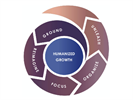Arun Sudhaman 13 Feb 2015 // 9:51AM GMT

A recent conversation with a global communications director reminded me that, for all of the talk of technological disruption of the PR business, the critical relationship between clients and consultancies often rests on less glamorous factors, in particular the chemistry between the various teams entrusted with an assignment.
As this particular comms director noted, good chemistry often trumps an average pitch. Conversely, no amount of strategic brilliance can make up for an emotional disconnect between client and agency.
A new study from the PRCA, surveying the group's panel of in-house communications directors, reinforces this view. Ignoring the fact that it is mawkishly timed to coincide with Valentine's Day, the study aims to reveal the 'rules of attraction' for clients that are searching for PR firms to work with.
According to the survey, the top attribute that clients are looking for during their initial meeting with a consultancy is ‘perceived knowledge of the business/sector’ (71%); followed by ‘chemistry/personality fit of team’ (58%); and ‘results for other clients/third party endorsement’ (46%). “The first meeting will generate subjective views on both sides and can help pave the way for a longer term relationship, provided the other key boxes on cost, creativity, and understanding of business are ticked.” — Ian Crowder, head of PR at The AA.The most frequent cause of client/consultancy relationships breaking down was ‘Less impressive results from the agency’ (71%); followed by ‘Less impressive creative ideas’ (62%); and ‘Ineffective communications between agency and in-house’ (46%).
Unsurprisingly, furthermore, communications directors note it is either very important (79%) or fairly important (17%) to meet the team that will go on to work on the account. Only 4% said it was fairly unimportant, and no one said it was not important.
Respondents also said that they currently oversee anywhere between one and six agencies. Retained relationships generally last anywhere between three and ten years; while projects generally between three and 12 months.
Interestingly, 'perceived creativity' (37.5%), 'cost' (25%) and 'perceived strategic planning' (20.83%) all rank fairly low. This is not to suggest that these factors are unimportant; as the PR world evolves, the increasing relevance of more sophisticated, multichannel strategies is undeniable.
But it also reminds us that more prosaic considerations — such as relationships, personality and industry knowledge — should never be overlooked.
[Image: Mauro Codella via Flickr]


































.jpg)




.tmb-135x100.jpg)












